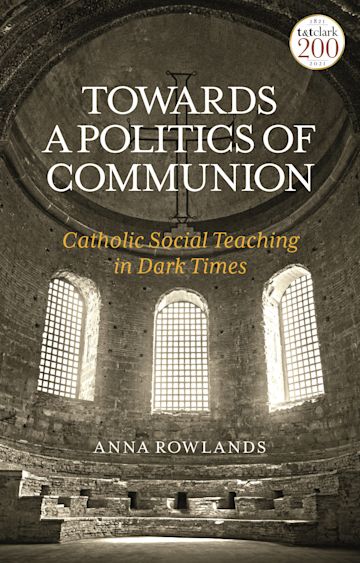Despite living in Ireland (such are the wonders of our digital age), at the start of the new year 2022, I happened to listen to a message from the Bishops Conference of Brazil! The message summed up the teaching now given by the Catholic Church that is so well documented in Anna Rowlands’ masterly study. “It is time to rebuild Brazil,” said Archbishop Walmor Oliveira, President of the Bishop’s Conference, “it is time to rebuild society in justice and peace. Selfish attitudes, unlimited consumption, disregard for the common home and indifference towards the poorest have caused many diseases. The aim of 2022, in fact for all followers of Christ, is to consolidate social friendship and fraternity through gestures of solidarity and the protection of rights and justice.”

The social and even political and environmental implication of the Gospel has become increasingly the message of the Church today, much to the annoyance of traditionalist wings that would prefer the focus to be on dogmatic orthodoxy and a limited set of moral issues. Yet, concern for the state of the world as a whole, has been part of Christian thought from the early centuries. There are civic virtues as well as theological ones, St Augustine said and although the society in which we live in this world is different from the heavenly city to which we are summoned, we must learn to behave properly in one before we can possibly earn a place in the other.
“Render unto Caesar what belongs to Caesar,” Jesus said, “and to God what belongs to God”
(Mk 12:17)
In fact, increasingly in the last century, even this tacit sense of dualism between our life in this world and the spiritual life, is being challenged by the Church. “How can we love God if we do not love our neighbour?” (cf. 1 Jn 4:20). And we must love our neighbour in the concrete situations of need in which, in this world, they find themselves. St James’ letter (maybe the first great social encyclical of the Church) reminds us not to favour the rich: “God has chosen those who are poor in the eyes of the world”. Moreover, “Suppose a brother or sister is without clothes and daily food, if one of you says to him, ‘Go, I wish you well, keep warm and well fed,” but does nothing about his physical needs, what good is it?” (2:16). Religious people, as Jesus’ parable of the Good Samaritan shows, can sometimes be more concerned with their religious ‘purity’ than getting involved in the painful situations of the world, but this is a fallacy. Accordingly, the trend of recent Catholic Social teaching holds that in being concerned for the welfare of others, Christians should be concerned with the economic and political aspects of life.
Sometimes when we think of the Church, we imagine a somewhat self-serving institution concerned to promote right belief and morals (orthodoxy and ortho-ethos), but not necessarily a prophetic challenge to the unjust structures in the world, which disenfranchise and cause suffering to the poor especially. The concern for ortho-oikonomia and ortho-politeia has perhaps been the best-kept secret in the Church, but now it is seeing the light of day and is becoming the message of the Church for our time.

Arendt respected the Church’s involvement in this area but argued it would always be hindered and banjaxed by the transcendent perspective it takes on the human person. Life in this world is never the final telos of human being and, therefore, Christianity, she argues, always renders life in this world as a somewhat secondary concern. The most important thing is to save one’s soul for the next. However, and Professor Rowlands points out, the Catholic Church has made a paradigm shift in the last hundred years which has built up momentum so that, since Hannah Arendt’s death in 1975, a genuine concern for this world has come to the forefront as a real priority in official Church teaching.
According to Rowlands, the Church retains a transcendent perspective on the human person, not in the sense that human meaning is centred on the next world but in the sense that it transcends any economic or political world-view or agenda. The transcendent value of the human person means that the state, political life and economic structures should exist for human flourishing and not visa-versa. This, Rowlands explains, is why a ’Social’ teaching is primary to a political or economic teaching. The latter are means, and can vary according to time and need, the former is built in to what it is to be human. The teaching of Pope Francis on the Environment applies this not only to the human but to the created world as a whole. The social now comes to include the ecosystem in which we ‘live and move and have our being’. Natural ‘goods’ are not to be exploited for political or capital purposes but need to be used sustainably for the benefit of local populations and future generations.
Towards a Politics of Communion looks at the emergence of the modern Catholic tradition of social teaching from the encyclical of Pope Leo XII in 1891 Rerum Novarum which responded to the dehumanizing of the Industrial Revolution up to Pope Francis’ recent encyclical Fratelli tutti which points out our common humanity in the face of narrow national, economic and religious interests. This tradition draws on Scriptural, Patristic and Medieval reflection on how we are by nature social beings and are called to create just forms of interaction. Therefore, political and economic life needs to be orientated toward the common good rather than selfish or ideological ends. Politics should not only serve to check evil but should allow participation at all levels in creating a more just and humane world.
In Fratelli tutti, Pope Francis outlines what he sees as the key social principles developed by the Church over the centuries. He lists seven of these: dignity of the person, the common good, preferential option for the poor, universal destination of goods, solidarity, subsidiarity and care for our common home. Professor Rowlands explicates these, giving an account of their roots and their recent development. She does not shy away from the critiques that can be validly made against this teaching or its internal consistency. She points out, for example, that John Paul II put much more emphasis on individual responsibility whereas other Popes like John XXIII and Francis are willing to speak more of social or structural sin of which the individual is a victim. Rowlands also points out some of the problems that arise when the Church adopts the language of human rights, as proponents of practices which the Church opposes, e.g., abortion, assisted suicide, also use ‘rights’ language.
Rowlands thus situates Catholic Social Teaching as an evolving tradition – evolving because it is constantly in dialogue with concrete situations and needs. Concern for human dignity in the Industrial Revolution gave rise to the defence of the value of labour over capital, and the claim that industry exists for the sake of the worker not for the sake of net profit. Reflection on the right to livelihood and participation in social and economic life led in turn to the consistent defence of migrant workers and, even more, of political and economic refugees. Everyone has a right to a ‘living wage.’ The seven ‘principles’ of CTS are gradually explicated through the Papal encyclicals, the teaching of the Second Vatican Council and other addresses.
The title of Rowlands’ book, Towards a Politics of Communion, reflects what she sees is a key concern of Catholic Social Teaching, namely, that the Church does not exist for itself but for others, that (in the language of the Second Vatican Council) it is a sacrament of unity for the world. CTS reaches out toward civic organizations quite independent from the Church and the secular practice of politics, trying to show that, when it comes to the welfare of humanity and the planet, there is a common interest.
Rowlands’ book focusses particularly on the official teachings of the Church magisterium but does not explore how CTS has been lived out in Parishes and Diocese and only touches on how Lay Catholic movements have been pioneers in this area. It would be interesting, as the synodal process now underway, to see the profile of CTS in this internal Ecclesial discernment. How much the seven ‘principles’ of CTS – dignity of the person, the common good, preferential option for the poor, universal destination of goods, solidarity, subsidiarity and care for our common home – are now being taken on by the Church at large? As can be seen in the New Year address given by the Bishops in Brazil, some Bishop’s Conferences are now prioritising it.
The synodal process now underway is a good example of one of the principles of CTS being put into action. It may also explain why engaging participation and feedback from all ‘levels’ of the Church feels strange to many. Subsidiarity may be the least understood of the ‘principles’ of CST. It has its roots in the tradition of professional guilds, charitable and civic fraternities in medieval society. Political and economic decision making and management should be participatory and not just relegated government and multi-national corporations. The state or market interests should not presume to dictate what could be much better managed at a local level. Trade unions are a modern face of subsidiarity.
Subsidiarity, in Catholic Social Teaching, points not so much to the lobbying of political and economic interests within the corridors of power as to a legitimate independence from that power. Self-regulation and delegated responsibility should mean that social groups are devolved from centralized bureaucracy and control. Such devolution in turn frees up government and international organizations to deal with issues that need a broader and more concerted policy. In other words, we don’t need a nanny state that gets involved in everything, decision making can be devolved. The body politic is something in which everyone can play their part, not only through voting but through local organizations. A good society (like the human body) has many ‘parts’ which function in their own ways and yet never independently. Subsidiarity is the principle which tries to maintain the integrity and connection between different forms of social governance.
To conclude, Anna Rowlands has given us a thorough and compelling study of CTS. She is an academic and the book enters into various dialogues with contemporary social and political science that may be well beyond the reading range of many who, like myself, have no specialist training in this area – the Index goes to ten pages. So, this book may not be the lightest or easiest introduction to the topic, but she writes clearly and has the academic advantage of being able to set arguments within historical context, and to show where the Church might learn something from secular reflection on the same subject. In the end this is an area where the sacred and the secular meet. Catholic Social Teaching is theological because of the Incarnation – because God has entered into and experiences fully the human condition. So, in the end, it points us back to reflecting on the Gospel as the paradigm for Christian engagement with the world. Not just the human world, as Pope Francis reminds us, for that same Word of God that becomes flesh in Jesus is the Word through which all creation came to be. Love of our common home is love of Christ.
The book is available from www.bloomsbury.com
Let us know your thoughts
If you’ve read the book or would like to just leave a comment about this book review, we welcome your thoughts and reflections in the comments box below. Thank you!
Book cover source: Bloomsbury.com





